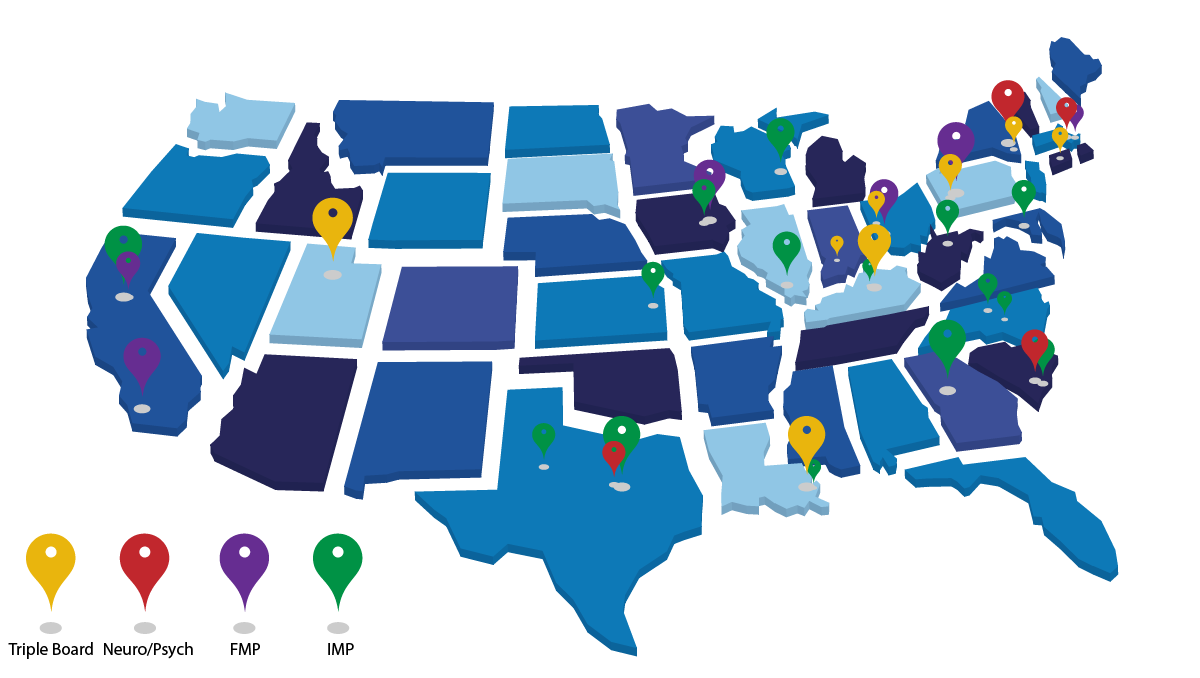Students & Residents
AMP provides valuable opportunities for students and residents. From mentorship opportunities to networking events, AMP enables students and residents to receive specialized training and gain amazing expertise.

Residency Programs
Combined residency programs are one pathway that prepares an individual to provide integrated care. The first combined psychiatry residency programs were started in the late 1980s and, as of 2019, the number of programs has grown to well over 30 combined programs. There are combined Internal Medicine/Psychiatry, Family Medicine/Psychiatry, Psychiatry/Neurology, and Pediatrics/Psychiatry/Child & Adolescent Psychiatry programs across the US.
With FREIDA, the American Medical Association Residency and Fellowship Database, learn more about the combined training programs. New combined programs are being added annually.
To search for combined elective opportunities, visit: https://freida.ama-assn.org/ Under specialties search Psychiatry/Family medicine, Internal Medicine/Psychiatry, Psychiatry/Neurology, and/or Pediatrics/Psychiatry/Child and Adolescent Psychiatry.
In addition to combined residency programs, sequential training (which entails completing a residency program in full followed by completing a second residency program) is another way to become proficient and boarded in multiple specialties.
If you are a medical student who would like more information about combined residencies or sequential training, please join AMP as a member and request a mentor. We would love to pair you with a resident mentor who can discuss one-on-one with you regarding combined residencies and sequential training.
Elective Medical Student Rotations
Many combined residency programs offer a combined elective to visiting medical students that provides exposure to what life is like in a combined program. Some of the rotations may include, for example, experience in Med/Psych or Family Med/Psych clinic or on a Med/Psych unit. Some may also give exposure to didactics and conferences specific to combined trainees. These rotations, while not necessary to apply to a combined program, can help solidify or clarify one’s interest in combined training.
To search for combined rotations, visit Visiting Student Learning Opportunities (VSLO) https://vslo.aamc.org/vslo/index.html#/public/find-electives and search for the specialty of “Internal Medicine/Psychiatry”, “Pediatrics/Psychiatry/Child and Adolescent Psychiatry”, “Psychiatry/Family Practice”, and “Psychiatry/Neurology”.
It is also recommended to search for medical schools which have combined programs as the rotations will be listed under those schools.
Fellowships
In addition to combined residencies and sequential residencies, there are also specific fellowships pertaining to integrated care. Fellowships are available to graduates of family medicine, psychiatry, and internal medicine residency programs. To search for the most updated list of fellowship programs visit FREIDA.
TNT Primary Care Psychiatry (PCP) Fellowship
The UCI School of Medicine TNT PCP Fellowship is a certificate program designed to expand and optimize primary-based care for those with commonly occurring behavioral health conditions.
The TNT PCP Fellowship is a year-long clinical education certificate program for primary care-oriented trainees and providers who wish to receive advanced training in primary care psychiatry. This training is provided by national experts at the interface of integrated psychiatric and general medical practice. There is a strong focus on learning with translation to excellent delivery of behavioral healthcare for mainly underserved populations.
Contract Negotiation for Combined Residents
Medical Students
Join your AMP RFMs for quarterly zoom mentoring sessions as they cover topics such as:
- “Preparing for the application process” including what to expect from away rotations, prepping your MS3/MS4 schedule, extracurricular activities and research that look good on an application;
- “Intern year Introduction (what to expect, tips and tricks)”;
- “Preparing your ERAS application and interviewing for Med-Psych/FM-Psych/Neuro-Psych”; and
- “Why Med/Neuro/FM-Psych? (What can you do as a career, where are grads now, etc)”
Come with your questions and our resident panelists will come with all their knowledge from their experience in getting through the application process.
Frequently Asked Questions (FAQs)
What is combined training?
What is sequential training?
Why do combined training?
What are some of the benefits of combined training and careers?
What do combined-trained doctors end up doing?
- Outpatient setting serving as patients' PCP and psychiatrist simultaneously
- Outpatient setting serving as a consultant psychiatrist within a primary care office
- Healthcare administration and academics
- Inpatient setting serving as psychiatrist and hospitalist on a med/psych unit
- Inpatient or outpatient setting working with geriatric patients
- Inpatient consult/liaison psychiatry service (act as a consultant to medical teams who need assistance with patients who are admitted with active medical issues and also have active psychiatric issues)
- Emergency room psychiatry (requires strong medical knowledge base)
- More specialized training (some combined physicians pursue fellowships post-combined training)
I have heard that combined doctors end up practicing one field or the other but not both. Is that true?
Why do combined training?
What are some of the difficulties of combined training?
One other difficulty lies in the fact that, because you are trying to master two different fields at once, you may feel behind in your knowledge base compared to your peers. However, you will catch up! Given that your residency training is longer than that of your non-combined peers, you will have time to catch up and feel competent in your knowledge base at the end of residency.
What do combined training programs look for when looking for applicants?
What electives should I do in medical school to be a good residency applicant?
How do I choose the right program for me?
How do I get more involved?
We strongly encourage and would enjoy you becoming more involved in AMP! As the national organization for combined trainees and physicians, AMP is a great location for networking, advocacy, and mentorship. Our annual conference is a great time to get plugged into AMP. Additionally, if you are a member of AMP, you can become a member of our medical student committee. There are also many other committees such as outreach/advocacy, membership, research amongst others that are seeking enthusiastic members. Our different committees are listed on our AMP officers page. Feel free to contact us here to request involvement in a particular committee.
Given the small number of programs, do most residents apply to the individual specialties in addition to the combined programs?
If I don’t match into a combined program, can I still do combined training?
Are combined programs open to having DO residents?
Are the combined internal medicine/psychiatry, family medicine/psychiatry, pediatrics/psychiatry/child & adolescent psychiatry, and neurology/psychiatry programs ACGME accredited?
Are combined residents allowed to do fellowships?
I still have some questions about combined training. What should I do?
We’d love to answer any other questions you have through our mentorship program! If you are a medical student member of AMP, you are able to request a mentor. You will be paired 1-1 with a combined or sequential resident with whom you can chat about combined training and careers. Visit the mentorship page for more information. Another great location to discuss combined training and careers is our annual conference. We hold a dynamic annual conference each fall that includes several events specific for medical students, including a residency fair. We’d love for you to attend our conference!
